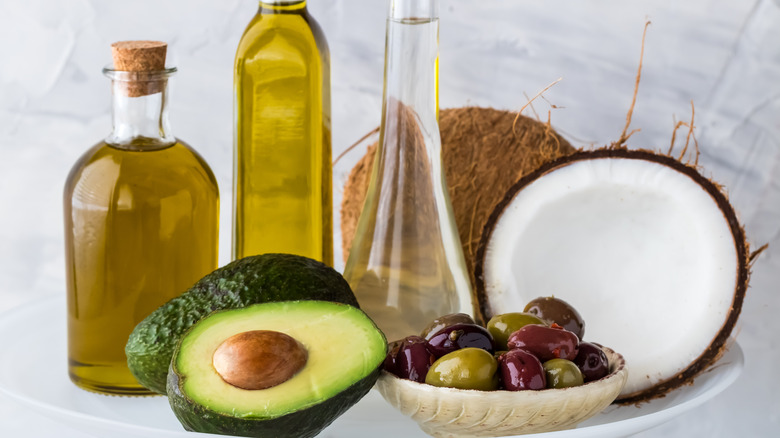Saturated Fat Vs. Unsaturated Fat: Which Is Healthier For You?
Navigating the nutrition levels of foods can be hard, especially when macronutrients such as fat can come in wildly different forms. Fats are often divided into "healthy" and "unhealthy" categories, but their differences go much deeper than that. From a scientific standpoint, some fats are saturated, and others are unsaturated. Saturated fats include coconut oil, butter, cream, cheese, and fattier pieces of pork and beef. Meanwhile, unsaturated fats include olive oil, avocado oil, and the oils found in most nuts and seeds. There are also trans fats, about which people often have questions.
Fats get a bad rap because they can be bad for your cholesterol, for example, and it's recommended that you don't eat fats at certain times of day, like in the morning. But what is the difference between saturated and unsaturated fats, and how can you determine which type of fat is better for you? Keep reading.
Eating these fats can actually lower your cholesterol
According to Healthline, the main difference between saturated and unsaturated fats lies in their composition. Whereas unsaturated fats have a looser composition and are therefore typically liquid at room temperature, saturated fats are denser in their composition. This means that their molecules are "tightly packed" together "with no double bonds between the fatty acids." Because they're so tightly bound, they're often solid at room temperature.
Now that you know the difference between these two types of fats, we've got to uncover which is ultimately healthier for you. According to the Mayo Clinic, the American Heart Association recommends that saturated fats only account for 7% or less of your daily calories, but why is this? The Mayo Clinic explains that it's ultimately about the density of saturated fat. Because they're tightly bound together — and therefore solid at room temperature — you're consuming more fat than you would if you were eating unsaturated fats. Saturated fat can raise your cholesterol levels at much higher rates than its counterpart.
While unsaturated fats are overall better for you, it's hard to completely cut saturated fats out of your diet. "Most fatty foods contain a combination of fatty acids. As such, many foods do not contain just saturated or unsaturated fats," explains Medical News Today. However, if you can steer more toward unsaturated fats, your body will thank you. According to Medical News Today, unsaturated fats can actually lower your cholesterol level, help decrease inflammation, and fortify your cellular membranes.
Ultimately, the best approach to these two fats is to limit your saturated fats while consuming enough unsaturated fats to keep your heart healthy without going overboard. It's a tightrope walk, but isn't everything in life?

